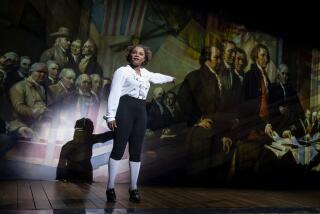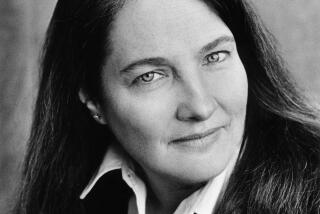No Glossing Over the Adamses’ Elitism, Ego
- Share via
AMERICA’S FIRST DYNASTY
The Adamses, 1735-1918
by Richard Brookhiser
The Free Press
$25, 256 pages
At a time when a certain sentimentalism is creeping into contemporary reconsiderations of the Founding Fathers, Richard Brookhiser’s new book about the Adams family comes as a bracing tonic.
Brookhiser, a senior editor at William F. Buckley’s National Review and a columnist for the New York Observer, admires the Adamses. He seems to share their skeptical conservatism. “The Adamses were skeptical about their country,” he writes, “because they were skeptical about man.”
But in “America’s First Dynasty,” a brisk brief survey of the lives of President John Adams, his son John Quincy Adams (also a U.S. president), his son, the diplomat Charles Francis Adams and his son, historian Henry Adams, Brookhiser planes no rough edges and applies no varnish.
His Adamses are the way historians and casual readers of their diaries, letters and writing have always seen them. They were vain, prickly, ambitious, condescending toward those who were not Adamses, always examining themselves to see if they were truly great, and if not, why not? None of their Calvinist Puritan ancestors could have examined their consciences for moral flaws more assiduously than the Adamses fretted about their place in the history of their beloved Republic.
For they did, after all, do great things for American independence and its ungainly child, the United States of America. John Adams often drove his colleagues half crazy, but he was a strong and steady force in the push for independence. John Quincy Adams was, like his father, a failure as president, but later as a congressman he spoke for the conscience of America in the debates over slavery before the Civil War.
Charles Francis Adams, sent by Lincoln as minister to Great Britain, worked successfully, with the help of Grant’s eventually victorious Union armies, to keep Britain from recognizing the Confederacy. And Henry Adams, the most recent and most accessible of the great chain of Adamses, casts a mordant and ironic eye over American history, past and present.
The genial David McCullough, in his most readable and current bestseller “John Adams,” gets as much of the sympathetic side of the Founder as a writer can.
John Adams becomes in McCullough’s hands almost an avuncular type; McCullough smoothes out his personality. McCullough makes little of the anti-Constitutional Alien and Sedition Acts of 1798, passed by Congress and signed by Adams.
Brookhiser will have none of that. A more elegant writer than McCullough, his judgments are incisive. Of John Adams’ writing style, Brookhiser notes that historians and biographers take most of their quotations from John Adams’ letters or diaries, and few from his published works of political theory. “That is because,” Brookhiser writes, “his published works are hardly ever quotable; in large patches, they are barely readable.”
Charles Francis Adams, whose stern self-control differentiated him from his largely drunken brothers and uncles, worked fitfully and ineffectively in politics. “John and John Quincy,” Brookhiser writes, “had both professed to be above the scrum of partisanship; to desire office only when it came to them; to disdain the fever of ambition. They were sincere enough in these professions to hobble themselves in their practice of politics; not nearly sincere enough to stay home.”
The Adamses came to regard the White House as practically their personal property and its current inhabitants, whoever they were, barely worthy of living there. Henry Adams patronized Grant, as his father had Abraham Lincoln. In the end the Adamses’ sense of superiority and aloofness from American life degenerated, in Henry Adams, into a vile anti-Semitism. He equated Jews with everything inferior to the Adamses, and his book “The Education of Henry Adams” is pessimistic and snobbish. But Brookhiser admires more his “Mont-St. Michel and Chartres.” Of Henry Adams’ infatuation with the 12th century veneration of the Virgin Mary, Brookhiser remarks that in contemporary America she has come to dwell among us as the Virgin of Guadalupe.
Brookhiser’s brief survey of the Adams men (their wives enter his story only tangentially) is deft and to the point. He has done well by this first of the first families, and well to boot by his readers.
More to Read
Sign up for our Book Club newsletter
Get the latest news, events and more from the Los Angeles Times Book Club, and help us get L.A. reading and talking.
You may occasionally receive promotional content from the Los Angeles Times.








